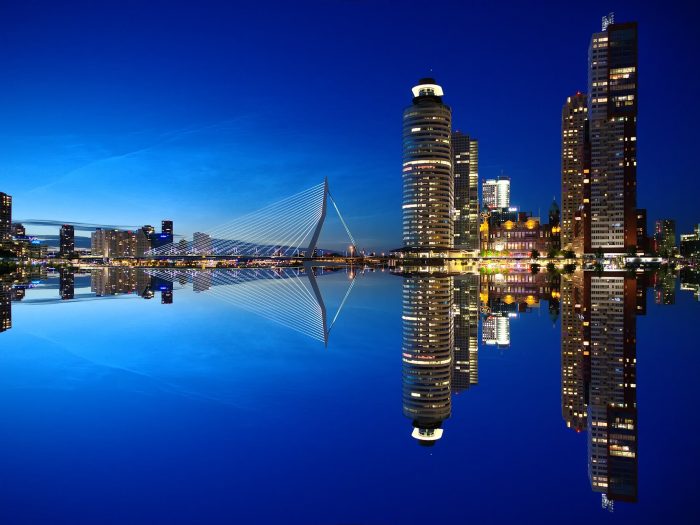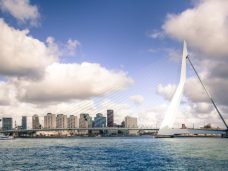Most people are aware of the advances Amsterdam has made as a tech city, especially as it is the capital of the Netherlands. Rotterdam dubbed the ’gateway to Europe’, is expanding its tech scene now more than it has in recent years.
Many companies and institutions are jumping on board in order to increase opportunities in the field of technology. “WeTechRotterdam” was founded by local businesses, including Hellpprint and 42workspace. Cambridge Innovation Center and the Erasmus Center for Entrepreneurship are backing local entrepreneurs, supporting them in turning ideas into real businesses.
This article is going to delve into the reasons why Rotterdam is so attractive for qualified professionals in the IT industry.
The high demand for tech staff in Rotterdam
Rotterdam is a popular city for fellow Dutch citizens as well as working expats. In 2017 the population hit 634,660, an increase from 584,058 in just a decade. This works out to be a growth rate of 10%. Even though the population is growing, there is still a shortage of tech talent. This is not an uncommon occurrence in the Netherlands. The demand for junior techs in the Netherlands is almost unreal. For every junior tech worker, there are 26 jobs available.
As there are not enough new graduates to fill all of the positions, companies are turning to expats. With the increase in expats, trends are changing and more companies are starting to use non-Dutch speaking developers. It is a straightforward and cheap process to relocate to Rotterdam. Many companies include a visit to Rotterdam and the office as a final part of the interview process. Once candidates see what is on offer, it is easy to encourage them to make the move.
The talent pool in Rotterdam
So, the shortage of tech talent in Rotterdam means that those qualified professionals in the labor market are snapped up quickly by large companies with international reputations and bigger budgets. It is hard for startups to get a look in. Rotterdam doesn’t have a technical university and so to speak, they aren’t growing their own talent pool. Large companies will still have their pick of the best but at least it would increase the talent pool. Even staffing agencies face the same issues. Still, companies in Rotterdam are going to great lengths to solve the tech shortage.
What are companies doing to attract more developers to Rotterdam
Many companies are putting a focus on company culture to attract staff. The working environment and extras play an important role in making the job look attractive. Young workers are interested in a fun atmosphere as well as things like open surroundings, flexibility, and communication. Listening to what candidates are looking for and implanting ideas including giving responsibilities and motivating staff. There is more of a focus on getting the work done rather than the fixed hours that people are working.
Financial incentives are always going to be a winner. Lunatech not only provides training but also bonuses for company-achieved goals, even tickets to meetups and tech conferences. One tactic is to maintain close relationships with schools and universities. Being proactive by networking helps students know more about the real opportunities available.
Opportunities for tech workers in Rotterdam
While companies are having problems filling positions, the opposite can be said for those seeking employment. Sterksen produced a study that claimed 5 out of 6 tech jobs being advertised in the Randstad area were not filled. This is more significant when you see that the average starting salary for software developers and data scientists is 35,000€. This is one of the highest figures in Europe.
Rotterdam keeps going with its advantages as specialists in fields that are not as commonly known. These fields include CleanTech, Energy and Agro-Food. Notable startups from Rotterdam include companies like Coolblue, HelloPrint, and Quantib.
Quanti is a medical AI startup. They don’t just develop AI solutions, they are building products with AI. Something this cutting edge is very appealing for tech professionals and it is why Rotterdam making its name as an important European tech hub.
In 2015, Rotterdam teamed up with The Hague to create a new metropolitan area. You can easily live in Rotterdam and work in The Hague, or even the other way round. The Hague is the largest safety and security cluster in Europe, offering numerous possibilities to anyone interested in cybersecurity.
Community initiatives for tech workers
Developers in Rotterdam are working hard to improve themselves by networking and learning, and they do so by going outside their own company. Empty and rundown buildings are being converted into hubs, areas for enthusiastic developers to meet and exchange ideas. Monthly meetups are held and on some occasions, a waiting list has to be created. With more funky areas popping up, more meetings are being held.
In fact, the Netherlands came 5th in the number of active members in tech meetup groups in 2017. They were only beaten by the UK, Germany, France, and Spain. TEDx Talks are held with the aim to improve communication on a local level.
What can we expect in the future
Dutch innovation hub
Rotterdam won’t take the place of Amsterdam as an international hub, or Eindhoven as a tech-area, but Rotterdam is establishing itself as an innovation hub. There are a great number of startups and they are starting to pay more attention to technology education. Developers in Rotterdam want entire neighbors of smart houses.
Economic development
It’s not just the tech industry that is contributing to Rotterdam’s success. The city is made up of a population of doers and it shows in the level of capital and investments. Thanks to the effort the city is making, Rotterdam is now a place where nationals and internationals want to live.
Attracting more entrepreneurs
Things are only looking up for Rotterdam. In 2014, 20% of international businesses chose West Holland to set up their business. In 2015 this grew by 10%. In 2017, 115 foreign companies either opened an office or expanded into West Holland. They are predicted to create more than 2,300 jobs as well as invest over half a billion euros into the area.



